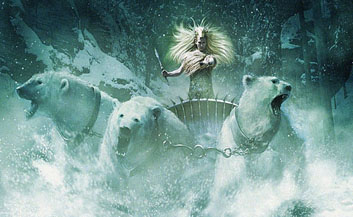|
|
Box Office - Decade at a Glance: September - December 2005By Michael LyndereyOctober 28, 2009
But it wasn't. Yes, King Kong opened with $50 million and eventually racked up $218 million, but there was a distinct air of disappointment on the part of those who follow box office. Another film had stolen Kong's thunder - after all, the Chronicles of Narnia: The Lion, the Witch and the Wardrobe opened with $65 million just the week before, and had holiday legs so good that it dropped over 50% the next weekend but still finished with an astonishing $291 million, thus becoming the fall season's highest grosser (and the second biggest film of the year, after Star Wars). Ironically, this large-scale adaptation of the popular novel had come to fruition only as a result of the success of Jackson's own fantasy films (as well as that of Harry Potter). Guided by Tilda Swinton's menacing work as the White Witch, some catchy special effects, an obvious appeal to children, and reviews that were positive if not uber-positive, Narnia had all the right elements put together to emerge as a natural successor to the founding fathers of the modern fantasy genre, the aforementioned Lord of the Rings and Potter films. Mr. Kong didn't stand a chance. The only other three digit earner came with good old Jim Carrey, whose team-up with Tea Leoni in Fun with Dick and Jane was only intermittently amusing and thus received only intermittent box office - but it eventually did rack up $110 million, a classic example of holiday legs doing the job they're paid to do. Outside of that, December was about evenly divided between Oscar-bait and the more commercial fare trying to attract holiday-season audiences. The Oscar-bait was led by drama Brokeback Mountain, Ang Lee's adaptation of Annie Proulx's short story. This is the one that broke Heath Ledger back into critical acclaim, after a period (2002-2005) of floundering in inconsequential films. Brokeback also won Lee his Best Director Oscar and grossed $83 million, but was beaten out for Best Picture by May contender Crash (at a total of $54 million, Crash remains the lowest grossing Best Picture winner of the decade, and also seemed to signal the beginning of an era when Oscar nominations went predominantly to movies that did not perform particularly well at the box office). Other meaty chunks of Oscar bait included Munich ($47 million total), Steven Spielberg's Israeli-set thriller, The New World ($12 million), Terrence Malick's widely ignored epic about early America, Japanese-set Memoirs of a Geisha ($57 million), and finally, Broadway adaptation The Producers, which grossed $19 million and thus again helped to suppress the musical genre (although that genre's still kicking).
[ View other Decade in Review columns ]
[ View other columns by Michael Lynderey ]
[ Email this column ]
|

|
|
|

|
Friday, November 1, 2024
© 2024 Box Office Prophets, a division of One Of Us, Inc.


